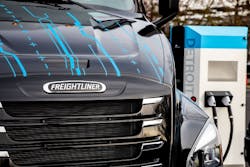Fleets Wait on Infrastructure Before Buying More EVs
In a survey of 56 trucking fleets, TravelCenters of America Inc. (TA) found that companies are taking proactive steps and making sustainability and emissions a priority. One out of five of those fleets have at least one electric vehicle now, though fleet executives indicate they’re hesitant to invest in alternative energy vehicles until the technology and infrastructure are more expansive.
The fleets surveyed have an average of 3,350 vehicles. Two of the fleets already have more than 100 EVs in use.
The survey was released as part of a new white paper from eTA, TA’s sustainability business unit, called “Sustainable Fuels in Trucking: The Greening of America’s Trucking Industry.”
The white paper found that by 2030, nearly half of medium - and heavy-duty electric trucks will be cheaper than diesel vehicles. The survey found that 21% of the fleets interviewed use electric vehicles – and only 5% use hydrogen vehicles – but they expect that number to double by 2030.
The survey also found that one in three of responded fleets already have adopted sustainability goals. It also found that utilities are expected to find additional power sources and make a transition from fossil fuel energy to something more sustainable.
The majority of the responding companies estimated that EV trucks will make up to 11-25% of their fleet by 2030. The survey found that because EVs will become more highly demanded in the market, utilities need to make sure their grids and equipment are up-to-date and resilient to variations.
“This white paper, the first in a series about the trucking industry’s transition to sustainable fuels and TA’s role in that process, identifies the key challenges the industry is facing and the support it will need from federal and state governments to be successful,” says Jon Pertchik, CEO, TravelCenters of America.
“One of the key findings is that many companies are hesitant to fully commit to alternative energy vehicles until the technology and infrastructure have matured enough for them to maintain efficient operations during the transition period and beyond.
“With the current range of EV and hydrogen-powered heavy-duty trucks, fleet leaders want to see a substantial number of available fast-charging and/or refueling stations before making larger investments in new vehicles. TA plans to be a leader in providing EV charging stations and hydrogen refueling for trucks at its over 275 travel centers as the industry adopts these sustainable fuels.”
TA is building a microgrid in Ontario, Calif., to provide fleet power and is expected to be open and operational by 2023.
